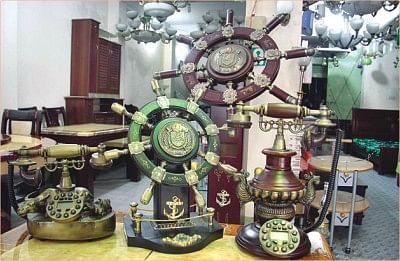Metal handicrafts: a dwindling legacy

Different exhibits are up for sale at a so-called marine antiques shop in Chittagong. Photo: Anurup Kanti Das
Jerry Huang, a Chinese tourist, was having a hard time bargaining with a shopkeeper for an articulately designed showpiece.
“This should not cost Tk 2,500. The prices are crazy here,” he grunts. Well, the seller seemed reluctant to let this item go for less than what he asked.
The fancy metal handicrafts shops at Gulshan 2 DCC market are bound to catch one's attention as they walk along. The shops, neatly lined up one after another, display thousands of handicraft items, mostly made of metal -- brass or bell metal -- and some made of wood.
The utensils, replicas of Buddha and deities like Shiva, Durga and Ganesh, old compasses from ships, binoculars, daggers, dice to make jewellery, lamps, padlocks that looks like fish, jewellery boxes, replicas of swans, horses and elephants, wooden chests, and even items that make one's head spin to predict their possible use -- it's all there. Most might not have any utility at all other than being a showpiece only for their immaculate designs and unique looks.
The foremost thing that would strike anyone there is the insignificant number of customers inside the shops. Most shop owners are sitting idly, reading newspaper or gossiping. Some shops do have customers inside, but they seem to be interested in just window-shopping, their eyes glittering with the exclusivity of the products.
The so-called “antique market” of Dhaka gets its seemingly overpriced items mainly from the scrap metal market at Mitford in old Dhaka. All scrap metal products from all around Bangladesh, primarily from Chittagong and Narayanganj, come to this market. Some products also come from Dhamrai, where production of brass handicrafts, especially replicas of deities, takes place. Even shop owners sometimes patch up the different parts of broken items to make a complete item.
There are brokers who go around collecting different items from the market, and selling here.
Jewel Majumder, a shop owner, says, “There is a scarcity of good stuff nowadays. Seldom do we collect good products and there are not too many customers either.” Customers are leaning towards lighter products such as glass, ceramic and plastic, rather than brass or bronze these days, he says.
“It's even hard to find brass, let alone find broken and scrap piece of brass. If I ask for Tk 1,500 for a half broken brass glass, would you buy it?” says Majumder. “Some people would say that I'm crazy. How can I make them understand that even scrap brass costs like Tk 450- Tk 500 now-a-days?” he says.
The shop owners rued the fact that business is dwindling day by day. “We don't have any business. We try our best to get rid of the existing products quickly and usually try not to bring in anything new,” says Swapan, another shop owner.
Brass products had quite a big industry in Nawabganj and these days, 90 percent are now closed, says Md Shahjahan. “The main reason is that there is no demand and no sales because they are heavy and people look for light utensils.”
“People don't understand that you don't lose money by purchasing bronze and brass products. It is almost similar to buying something next-to-gold,” says Shahjahan.
“I'm just saying from my experience. If you buy bronze and brass products, the resale value is always high, maybe close to the purchase price. But this option is not there for glass or plastic products.”
These deity replicas are trademarks of Dhamrai production. These products have been in the making since the British era and are limited among a specific group of manufacturers because of the preciseness of the work. The problem is that there are only a few people who make them and they don't let other people know about the process, says Shahjahan.
“If they did, there could be mass production and prices would drop. They only want to make profits by themselves, even if they are hurting the business,” he says.
“Big brands, like Aarong and Jatra, are also selling brass products now and customers usually don't want to come to our shops now.”
The pricey items are obviously out of the reach for the middle-income groups, so these handicrafts mostly go to the high-ups and expatriates living in Dhaka. “Of course, rich people mostly buy these items. The poor can't fancy buying a brass glass paying Tk 1,500. It's illogical,” says Shahjahan. Almost 60 percent of customers are foreigners, he adds.
When a ship comes to Chittagong Port for breaking, concerned authorities give clearance after inspection that there are no explosives or other harmful objects. After issuance of a certificate, the owner gets ready to break the ship.
The shipyard owner contracts different people to dismantle different parts of the ship -- wooden items, electronics items, and wires. Gradually, after different contractors take away different parts, the ship becomes ready to be cut and various products of this handicrafts market come out, intact or broken.
Shop owners blamed a lack of ship breaking as the cause behind a low volume of sales. Shahjahan says, “Ship imports are even low now because of some ban on environmental issue.”
“When I can't buy food for seven days and I'm hungry, there is no time to care about the environment.”
“Some people are sabotaging the ship breaking industry for the sake of the environment. There are always and will be risks of harming the environment. There were times when burnt mobil was thrown into the water but I don't think anyone does it now. As far as I know, now they scrape it and put it under the soil.”
He says ship importers are capable of breaking the ship in a non-hazardous way. “If they are allowed to do it on a large scale, there would be a surge in metal input -- copper, brass, bronze and iron. But if the ships are not allowed to come, what can we do?”
Shahjahan also says the ship import ban is hurting the re-rolling mills, which are shutting down due to dearth of scrap metal. That will also hurt the construction industry, he adds.
Sometimes, handicrafts sellers put together the parts of different items to produce a new one. The recasting process requires lathe machines and casting factories.
Majumder complains, “You have to make craftsmen understand how you want the item to be made, so that it can be sold. If you want to go to old town for all that, your whole day is lost in transportation.”
“Who will take the responsibility? I don't know what fate has in store for us,” Majumder says, as he started to dust a brass bowl.

 For all latest news, follow The Daily Star's Google News channel.
For all latest news, follow The Daily Star's Google News channel. 



Comments